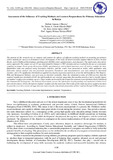Please use this identifier to cite or link to this item:
http://ir-library.mmust.ac.ke:8080/xmlui/handle/123456789/2459Full metadata record
| DC Field | Value | Language |
|---|---|---|
| dc.contributor.author | Obeywa, Herbert Amunavi | - |
| dc.contributor.author | Oluoch, Teresa A. Okoth- | - |
| dc.date.accessioned | 2023-12-07T13:39:53Z | - |
| dc.date.available | 2023-12-07T13:39:53Z | - |
| dc.date.issued | 2023-11-18 | - |
| dc.identifier.uri | https://doi.org/10.51867/ajernet.4.2.120 | - |
| dc.identifier.uri | https://ajernet.net/ojs/index.php/ajernet/article/view/209 | - |
| dc.identifier.uri | http://ir-library.mmust.ac.ke:8080/xmlui/handle/123456789/2459 | - |
| dc.description.abstract | The purpose of this research was to compare and contrast the efficacy of different teaching methods in preparing pre-primary school students for success in elementary school. Participants in the study included Curricula Support Officers (CSOs), Section Heads, Early Childhood Development and Education (ECDE) center administrators, and educators. The study took a descriptive survey approach. The sample size of 215 was determined by Yamane's (1967) formula and was reached by the use of a systematic sampling technique. Focus group discussions (FGD), questionnaires, and in-depth interviews were all used to compile the data. Quantitative data was analyzed using descriptive statistics, and the results were presented in tables, while qualitative data underwent content analysis and was presented narratively. Parametric and non-parametric tests were utilized in inferential statistics, and a 5% significance threshold was applied in a logistic regression analysis to assess the null hypothesis. The Shapiro-Wilk and Kolmogorov-Smirnov tests were used to check for normality. Since the calculated p-value of 0.042 was less than the required significance threshold of 0.05, the null hypothesis was rejected, suggesting that teaching practices had a sizeable impact on students' readiness for academic success. These results can be used by the County Government to provide better Early Childhood Development (ECD) programs. The National Government can use this information in policymaking and regulation to better track and control schools, which will improve students' readiness for the classroom. The results of this study may prove useful to teachers because they provide a variety of suggestions for improving the educational preparation of their students through ECDE programs. | en_US |
| dc.language.iso | en | en_US |
| dc.publisher | AFRICAN JOURNAL OF EMPIRICAL RESEARCH | en_US |
| dc.subject | Assessment,Influence, Teaching, Methods on Learners, Preparedness, Primary, Education | en_US |
| dc.title | Assessment of the Influence of Teaching Methods on Learners Preparedness for Primary Education in Kenya | en_US |
| dc.type | Article | en_US |
| Appears in Collections: | Gold Collection | |
Files in This Item:
| File | Description | Size | Format | |
|---|---|---|---|---|
| Assessment+of+the+Influence+of+Teaching+Methods+on+Learners+Preparedness+for+Primary+Education+in+Kenya+-+Amunavi+1.pdf | 867.07 kB | Adobe PDF |  View/Open |
Items in DSpace are protected by copyright, with all rights reserved, unless otherwise indicated.
